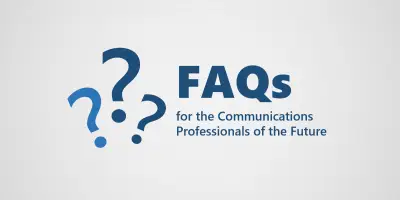Last week, I was a speaker on the Communications and Marketing Panel at Goldsmiths University of London, addressing future communication professionals keen to get into the industry after graduation and eager for insight and advice on how to do this.
We hear time again that the jobs market is competitive, and the communications industry is no different – the competition is fierce. I’ve put together FAQs to give an insight into the industry and to help shed some light on what people can do to stand out from the crowd:
1. What type of work is involved in being a communications professional?
Every day is different, but here’s an idea of what we do:
First thing in the morning, we’re looking through all of the newspapers as well as online and broadcast news to identify relevant items for our clients and opportunities for them to provide comment on stories.
Then we’ll turn to producing and selling in press releases to secure coverage in target publications, organising meetings with MPs and journalists, providing briefings to clients on issues or people relevant to them, handling media enquiries, producing letters to stakeholders and responses to government consultations and managing social media platforms, all with the aim of striving to raise clients’ profiles and meet their political and media aims.
2. Does my degree matter?
Not necessarily. A humanities-based – Politics, History, English etc – are more common (with a grade of 2:1 or above). There is a growing number of specific Communications degrees on offer at universities as well. It’s also important to note that the industry is becoming increasingly focused on the digital world, so degrees in this area will also be valued.
It is more common for a company to consider a candidates broader experience as well. Someone with a well of work experience in relevant fields will be in great stead.
3. Do I need a Masters?
It is not a pre-requisite. Many of my colleagues here at PLMR do have Masters in a whole host of areas, ranging from International Relations through to Social Research. The skills developed through these courses will certainly be valuable to a communications organisation. Nonetheless, other colleagues, myself included, do not have a Masters, and this didn’t have a bearing on whether or not we got the job.
4. How do I get my foot in the door?
Experience is really important. While you’re at university, make sure you use your holidays to gain valuable experience. This can be anything from working with an MP or in a local council, through to working for a local or national newspaper or supporting a charity with their social media work.
If you can demonstrate that you have good experience and an understanding of how the industry works, it will help you stand out.
Many communications companies offer internships which are a great opportunity for a) you to gain valuable experience of the industry and b) for the company to learn about you and what you can do – if they like what they see, you may find yourself with a full time job!
When looking for opportunities, look for companies, who like PLMR, offer paid internships. There are many companies out there who are happy not to pay their interns, but we’re not like that. We are proud to be a living wage employer and we offer paid 3-month internships. Many of us at PLMR started out as an intern and are building successful careers as consultants on the back of those first three months.
5. What do you look for in a candidate?
The communications industry is fast-paced and exciting, and companies want people to rise to the challenge and deliver results. Everything we do is about delivering tangible results for our clients, whether that’s a tax-cut for the bingo industry or securing thousands of pieces of coverage for veterans’ charity Combat Stress.
The ideal candidate would be ambitious, creative, motivated with a can-do attitude, have strong communication skills and initiative, be social media savvy, and have a keen interest in current affairs. It is also important that candidates understand the company and knows what clients or projects is it working on. A good look at the company’s website is the best way to start with this.
6. When is the best time to apply?
Generally there’s not a best time – opportunities arise throughout the year depending on the individual companies. As an example, our 3-month internship programme runs on a rolling basis.
The best thing to do is keep an eye on website like w4mpjobs.org and LinkedIn as well as social media, because companies are increasingly using social media to advertise their vacancies.
Also, do some research into the companies you’d like to work for – do you want to work in-house or in an agency? Would you like to specialise in a particular sector or work across sectors? Once you know what you’d like to do, make sure you keep up to date with what your chosen companies are working on – being able to show that you know the company will help with your application and your interview.




